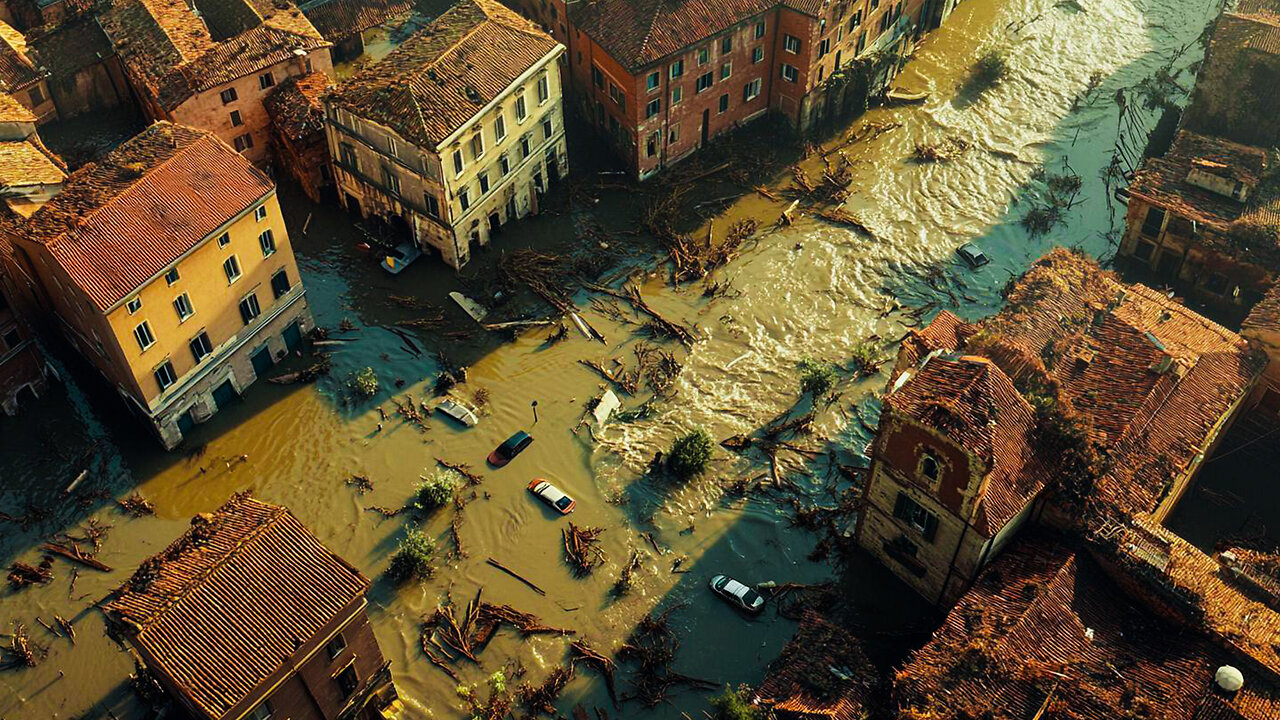Premium Only Content

Italy NOW! Landslides and Floods: Storm Boris Leaves a Trail of Destruction
Just a few days after Storm Boris flooded Central Europe, it struck the northeastern part of Italy. Heavy rains led to the evacuation of 1,000 residents, two people were missing, and many towns were submerged. Emilia-Romagna, which was devastated by a deadly flood last year, once again found itself at the epicenter of a natural disaster.
In the city of Faenza, the water level in the rivers rose sharply overnight, flooding homes and streets. Many residents were forced to leave their homes in boats. This flood marked the third in 16 months, and people are in despair as their recently repaired and painted homes have been inundated with dirty water.
The storm also affected the region's capital, Bologna, where river levels rose, prompting warnings about potential new floods and landslides.
In Ravenna, schools, libraries, and parks have been closed, and the University of Bologna canceled exams and classes. Throughout the region, roads have been damaged, and train services are severely disrupted.
The flooding also impacted parts of the neighboring region of Marche.
Falconara, a coastal town on the Adriatic, experienced a true deluge — 204 mm of rain fell in two days, three times the average for September. In the Apennine mountains, over 300 mm of rainfall caused landslides. Although the rain stopped by the end of the week, the risk of new floods remains.
The storm has reignited discussions about the climate crisis in Italy, which faced wildfires, droughts, and extreme heat this summer. The situation globally is becoming increasingly unpredictable, and natural disasters are occurring more frequently and destructively.
Humanity could face complete collapse if urgent measures are not taken. We found information about technologies that could help mitigate the impact of these disasters in the Science Film "Water From Air: The Path to Saving Humanity." Watch this film and share it with others — it's truly important for our future.
-
 42:28
42:28
AllatRa TV
7 days agoThe Day the Earth Was on the Brink
109 -
 2:00:58
2:00:58
RealAmericasVoice
11 hours agoWAR ROOM WITH STEVE BANNON AM EDITION
104K20 -
 2:59:47
2:59:47
Wendy Bell Radio
10 hours agoAmerica Drops The Gloves
105K59 -
 1:22:27
1:22:27
Steven Crowder
5 hours agoGeorge Washington, Our First President | 3 in 3 Special
296K187 -
 1:03:57
1:03:57
Kyle Fortch
6 hours ago $1.44 earnedDJ Chill: DJing For Jelly Roll, SOLD OUT Tour, Performing at Hometown Arena | THE ONE SHEET S1E4
47.5K3 -
![The Deep State Spied On Trump & Sabotaged 2020 Operation To Oust Maduro [EP 4440-8AM]](https://1a-1791.com/video/fwe1/94/s8/1/F/5/k/Z/F5kZx.0kob-small-The-Deep-State-Spied-On-Tru.jpg) 4:05:26
4:05:26
The Pete Santilli Show
17 hours agoThe Deep State Spied On Trump & Sabotaged 2020 Operation To Oust Maduro [EP 4440-8AM]
66.9K3 -
 41:53
41:53
Rethinking the Dollar
4 hours agoHype or Hope? Will THE 50-YEAR FORT KNOX GOLD SCANDAL BE EXPOSED?
33K10 -
 1:32:36
1:32:36
Game On!
19 hours ago $10.49 earnedPresident Trump TAKES OVER the Daytona 500!
76.8K16 -
 21:35
21:35
DeVory Darkins
3 days ago $27.27 earnedMitch McConnell TORCHED as Secretary of HHS is sworn in
157K197 -
 1:20:04
1:20:04
Tim Pool
4 days agoGame of Money
200K12